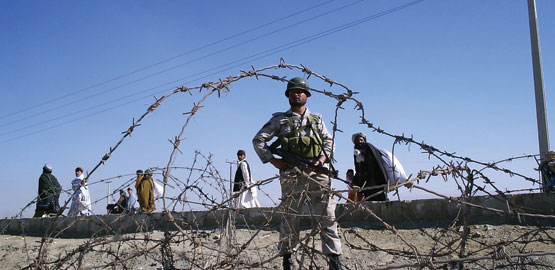State and its practices:
some marginal notes
Ömür Harmansah ~ September 25, 2007 ~ Blue State cafe.
"Suppose you came as an explorer into an unknown country with a language quite strange to you. In what circumstances would you say that the people there gave orders, understood them, obeyed them, rebelled against them, and so on? The common behaviour of mankind is the system of reference by means of which we interpret an unknown language"
Ludwig Wittgenstein, Philosophical Investigations §206. Cited in Stanley Cavell's Foreword to Veena Das, Life and words: violence and the descent into the ordinary. 2007: ix.
~~~
Veena Das and Deborah Poole suggest in their introduction to the 2004 edited volume Anthropology in the Margins of the State to explore an "ethnography of state as embedded in practices, places and language considered to be at the margins of the nation-state." There, they "distance [themselves] from the entrenched image of the state as a rationalized administrative form of political organization that becomes weakened or less fully articulated along its territorial or social margins" (Das and Poole 2004: 3). Althusser's perspective on the practices of the state was very much through a macro lense: the ideological state apparatuses. But then his discussion of the educational state apparatus, a non-coercive program that has worked very effectively for the modern-nation state in the last century or so in "the formation of the distinctly governmentalized subjects" (in Foucault's terms), does manage to reach the everyday life of its citizens. One fearful example I recall from Penn was the new Wharton School building the university had constructed in early 2000s (nicknamed R2D2 by students because the awful building did look like the Star Wars character), where classrooms were pumped with oxygen during class hours so that the students would not fall asleep. To my astonishment there was little resistance from the Wharton student body about this.

In any case, my understanding is that contemporary ethnographers of the modern state have been turning towards the "marginal practices, places, and language... essential to a robust understanding of the state." ( Stevenson 2007, see also States of Imagination: Ethnographic Explorations of the Postcolonial State edited by Thomas Blom Hansen and Finn Stepputat). If we would want to pull our discussions of the ancient/early states to a similar direction, what can be done? One fascinating point that is being made under contemporary discussions of "governmentality" and "states of exception" (esp. based on the work of Giorgio Agamben) that the state institutionalizes the juridicial order in society while it suspends this order by using violence against its own subjects (note here Casey's discussion of Weber's ideas of the state and his famous concept of the "monopoly on the legitimate use of physical force"). How does violence operate on the local subject? How does the state impact the "spaces of exclusion and inclusion" on its margins? What is the spatial formation of the state, so to speak?
Stevenson 2007, see also States of Imagination: Ethnographic Explorations of the Postcolonial State edited by Thomas Blom Hansen and Finn Stepputat). If we would want to pull our discussions of the ancient/early states to a similar direction, what can be done? One fascinating point that is being made under contemporary discussions of "governmentality" and "states of exception" (esp. based on the work of Giorgio Agamben) that the state institutionalizes the juridicial order in society while it suspends this order by using violence against its own subjects (note here Casey's discussion of Weber's ideas of the state and his famous concept of the "monopoly on the legitimate use of physical force"). How does violence operate on the local subject? How does the state impact the "spaces of exclusion and inclusion" on its margins? What is the spatial formation of the state, so to speak?
In this line of thought, I would also like to come back to the question I raised during the conference concerning the idea that the state always has to present itself as a thing, prove its status of being real, and not to appear as a distant abstraction. How does the state manage that? Techniques of governmentality in subjection of citizens, ideological discourses that penetrate into everyday life, culturally and politically specific practices and public performances (see image above)? What are the embodied, lived experiences of the presence of the state in the everyday life of individuals (see image below)? Routledge suggests (a) the "demarcation of the social space of the state," i.e. bounding (Routledge 25) with marked territorial boundaries, constriction of travel and construction of an authoritative center; (b) "Differentiation" as in the maintenance of the exclusionary apparatuses of the state, (c) "Articulation" as "specific configurations of power in which selected cultural resources and social forces are aligned so as to give material substance and symbolic coherence to the ideological claims of the state". (Routledge 25). This last discussion takes me back to our discussion of Jose Saramago's assertion "that there is no insurmountable contradiction between aesthetics and authority." (see e.g.  Ozyurek 2004)
Ozyurek 2004)

This may sound over-ambitious and idealistic, but I have a feeling that archaeology has all the capability in approaching the everyday performances of the state, its effective appearances in places, its deep operations in the language, the making of the images of the state in things, everyday materialities, finally its configurations of the human body. As long as one moves away from the idea that the state is a unified solid entity, a thing, a holisticly defined structural BAUPLAN and that its (cumulative) formation involves certain levels of arbitrariness and serendipidity (salut Bourdieu!), that it is defined by a set of practices, discourse and performances, and that it is historically contingent and culturally specific such that one avoids universal state models (e.g. Michael Mann's grand scheme), we should be on a promising and refreshing grounds to talk about the state (as if it exists).
Posted at Sep 26/2007 12:57AM:
Erin F: I'm glad you've brought this up, as it's addressing the major problem I've had with our material so far. It feels like we're forgetting the people on the ground somehow... In thinking of these things in terms of Egypt, I'm wondering now nominal state ideology is the the average farmer. I'm wondering if one of Routledge's points above might be extremely pertinent, at least in terms of Egypt (and perhaps other ancient "states"?): bounding, or perhaps better boundaries. I don't believe that people who didn't live at the edge of their world were as conscious of the state/power actor as people who were seeing the day to day negotiation of us vs. them. The average guy maybe interacted with the agents of his regional governor, who'd come to collect surplus grain (which they probably wouldn't want to keep anyway for storage/preservation issues) or say, "Hey, it's all floody...why not go work on that temple down the way?" I don't know that even the concept of ISAs is particularly relevant, unless the state is absorbing the familial/moral ISA into the official ideology.
It's rather late, and I don't know if this makes sense or is relevant. Attack please.
